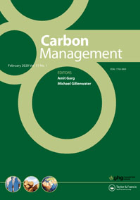
Carbon Management
Scope & Guideline
Exploring Innovative Strategies for Effective Carbon Management
Introduction
Aims and Scopes
- Carbon Accounting and Reporting:
Research on methodologies and standards for measuring and reporting greenhouse gas emissions, including corporate accountability and compliance with international protocols. - Carbon Sequestration Techniques:
Exploration of various methods for enhancing carbon storage in different ecosystems, including forests, agricultural lands, and urban areas. - Policy and Governance:
Analysis of policy frameworks and governance structures that facilitate carbon management and mitigation strategies at local, national, and global levels. - Technological Innovations:
Investigation of new technologies and approaches for carbon capture, utilization, and storage (CCUS), as well as their implications for energy systems. - Ecosystem Services and Biodiversity:
Examination of the interplay between carbon management practices and ecosystem services, including biodiversity conservation and sustainable land use. - Socio-economic Impacts:
Assessment of the socio-economic dimensions of carbon management, focusing on how different practices affect communities, industries, and economies.
Trending and Emerging
- Nature-based Solutions:
Research focusing on nature-based approaches, such as reforestation and soil carbon enhancements, is gaining traction as effective strategies for carbon sequestration and biodiversity preservation. - Corporate Carbon Accountability:
There is an increasing emphasis on corporate responsibility in carbon accounting, with studies addressing the effectiveness of various GHG accounting frameworks and corporate strategies for emissions reduction. - Climate Change Mitigation Strategies:
Emerging themes around integrated climate strategies that combine technological solutions with policy initiatives are becoming central, reflecting the need for comprehensive approaches to achieve net-zero targets. - Urban Carbon Management:
As cities become major contributors to carbon emissions, research on urban carbon management—focusing on embodied carbon in buildings and infrastructure—is on the rise. - Impact of Climate Policies:
An increased focus on analyzing the effectiveness and implications of various climate policies and regulations is evident, particularly in the context of achieving national and international climate commitments.
Declining or Waning
- Traditional Industrial Emissions:
Research on emissions from traditional industrial sources, such as fossil fuels, is decreasing, possibly as the focus shifts towards innovative technologies and renewable energy solutions. - Carbon Offsetting Mechanisms:
Interest in conventional carbon offsetting strategies may be declining, as the field moves toward more integrated and holistic approaches to carbon management. - Single-factor Carbon Management Studies:
Studies that examine carbon management from a one-dimensional perspective (e.g., only focusing on carbon footprints) are becoming less prominent in favor of multidisciplinary approaches that consider broader environmental impacts.
Similar Journals

Green Energy & Environment
Championing Open Access Research for Environmental Progress.Green Energy & Environment, published by KEAI PUBLISHING LTD, stands as a pioneering journal dedicated to the dynamic fields of renewable energy, sustainability, and environmental science. With its ISSN 2096-2797 and E-ISSN 2468-0257, this Q1 journal holds a noteworthy presence in academic discourse, reflecting its high-quality contributions within these critical areas of research. Launched in 2016, it has consistently embraced an Open Access model, facilitating unhindered access to research findings and fostering collaboration across global communities. Based in Beijing, China, this journal is dedicated to disseminating innovative insights that are essential for addressing urgent global challenges related to energy and environmental sustainability. Researchers, professionals, and students alike benefit from a platform that not only showcases pioneering research but also encourages interdisciplinary dialogue and knowledge exchange in the pursuit of a sustainable future.

C-Journal of Carbon Research
Exploring Innovative Solutions in Carbon ResearchC-Journal of Carbon Research is an innovative and dynamic journal published by MDPI, situated in the picturesque city of Basel, Switzerland. Launched in 2015 and operating under an Open Access model, the journal aims to promote the dissemination of high-quality research related to carbon science, environmental sustainability, and renewable resources. With a current impact factor reflecting its growing influence in the field, the journal's standing is bolstered by its Scopus ranking, placing it in the 37th percentile in the Environmental Science category. It offers a platform for researchers, professionals, and students alike to engage with cutting-edge studies, reviews, and discussions that contribute to environmental science advancements. As the journal continues its convergence journey from 2022 to 2024, it remains committed to fostering scholarly exchange and interdisciplinary collaboration on pressing carbon-related challenges.

Mires and Peat
Exploring the Depths of Peatland EcosystemsMires and Peat is a premier open-access journal focusing on the intricate and vital ecosystems of mires and peatlands, published by the International Peatland Society and the International Mire Conservation Group. Established in Germany, this journal has been serving the scientific community since 2006 and offers a unique platform for researchers, conservationists, and students to explore topics pertinent to aquatic sciences, ecology, and soil science. With impressive rankings across several Scopus categories, including a Q2 designation in Ecology and Nature and Landscape Conservation, Mires and Peat is recognized for its vital contributions to environmental science. The journal aims to disseminate innovative research and foster discussions that enhance understanding and conservation of peatland ecosystems, which are crucial for global biodiversity and climate regulation. Accessible to a broad audience through its open-access model, Mires and Peat stands out as an essential resource for those dedicated to advancing knowledge in this critical field.

GLOBAL BIOGEOCHEMICAL CYCLES
Unraveling the complexities of biogeochemical processes.GLOBAL BIOGEOCHEMICAL CYCLES, published by the American Geophysical Union, is a leading journal in the field of geochemistry that has gained significant recognition since its inception in 1987. With an impressive impact factor and a Q1 ranking in multiple categories such as Atmospheric Science, Environmental Chemistry, and Global and Planetary Change, it serves as a crucial platform for the dissemination of high-quality research. This journal emphasizes interdisciplinary studies focusing on biogeochemical processes and their implications for global environmental change, attracting contributions from a diverse range of scientific communities. Researchers, professionals, and students engaged in atmospheric sciences, environmental chemistry, and planetary sciences will find invaluable insights and state-of-the-art methodologies within its pages. GLOBAL BIOGEOCHEMICAL CYCLES continues to advance our understanding of the Earth’s systems, thus holding a pivotal position in shaping future environmental policies and sustainability efforts.
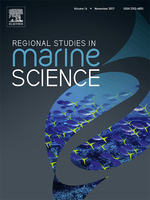
Regional Studies in Marine Science
Fostering Sustainable Practices through Marine StudiesRegional Studies in Marine Science, published by Elsevier, is a leading academic journal dedicated to advancing the understanding of marine ecosystems and their regional dynamics since its inception in 2015. With an ISSN of 2352-4855, this journal is indexed in Scopus and has achieved impressive ranking quartiles, notably Q2 in categories like Animal Science and Zoology, and Ecology, showcasing its relevance and impact in these fields. As of 2023, it ranks in the 79th percentile for Animal Science and Zoology, reflecting its significant contribution to academic discourse. While the journal operates under a traditional access model, its rigorous peer-review process ensures the publication of high-quality research that is crucial for understanding ecological interactions and fostering sustainable practices within marine environments. Researchers, professionals, and students alike will find this journal an invaluable resource for the latest findings and advancements in marine science, as it strives to bridge the gap between research and practical application at regional and global levels.

Forest Ecosystems
Championing open access to forest research.Forest Ecosystems is a prestigious open access journal published by KEAI PUBLISHING LTD, dedicated to advancing knowledge in the fields of forestry, ecology, and conservation. Established in 2014 and located in Beijing, China, this journal has rapidly gained prominence, achieving Q1 status in multiple categories, including Ecology, Evolution, Behavior and Systematics, and Forestry in 2023. With an impressive rank of 19 out of 174 in the Scopus category of Agricultural and Biological Sciences - Forestry, it stands in the 89th percentile, reflecting its influential contributions to the field. The journal fosters scholarly discourse and disseminates innovative research aimed at understanding forest ecosystems and their vital role in our environment. Offering a robust platform for researchers, professionals, and students, Forest Ecosystems ensures accessibility through its open access format, enabling a wider audience to engage with and benefit from cutting-edge research dedicated to the stewardship of forest resources.
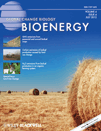
Global Change Biology Bioenergy
Exploring the Nexus of Biology and BioenergyGlobal Change Biology Bioenergy, published by WILEY, is a leading peer-reviewed journal that focuses on the interplay between biological processes and bioenergy production, contributing significantly to the fields of agronomy, forestry, and environmental sustainability. Established in 2009, this Open Access journal, based in Germany, has gained recognition in the academic community, boasting impressive quartile rankings in 2023: Q1 in Agronomy and Crop Science, Forestry, Renewable Energy, Sustainability and the Environment, and Waste Management and Disposal. With its rigorous publication standards and commitment to disseminating vital research, Global Change Biology Bioenergy ranks highly in various Scopus categories, ensuring that cutting-edge studies reach a broad audience. By providing a platform for innovative research, the journal fosters collaboration and knowledge exchange among researchers, professionals, and students dedicated to tackling the pressing challenges posed by global change and the future of bioenergy.
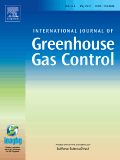
International Journal of Greenhouse Gas Control
Pioneering research in greenhouse gas management.The International Journal of Greenhouse Gas Control, published by Elsevier Science Ltd, serves as a premier platform for disseminating cutting-edge research on greenhouse gas management and mitigation strategies. Since its inception in 2007, this journal has made significant contributions to the fields of Environmental Science, Engineering, and Policy, boasting a remarkable Q1 status across various categories, including Energy and Pollution, as of 2023. With its focus on innovative scientific approaches and technological advances, the journal ranks among the top publications in its field, holding impressive positions such as Rank #15 in General Energy and Rank #27 in Environmental Science and Pollution. Although it follows a subscription-based model, its impact factor underscores its importance in shaping effective policies and practices that can mitigate the challenges posed by greenhouse gas emissions. Researchers, professionals, and students alike will find this journal an invaluable resource for the latest findings and discussions that drive the global agenda on climate change and sustainability.

Boletin del grupo espanol del carbon
Driving Excellence in Carbon Research and DevelopmentBoletin del Grupo Español del Carbon, a pivotal journal in the field of carbon science, is published by the Grupo Español Carbon and serves as a significant platform for disseminating research related to carbon materials, their applications, and advancements in carbon technology. With an ISSN of 2172-6094, this journal aims to bridge the gap between academia and industry by featuring original research articles, reviews, and noteworthy contributions from specialists in the sector. Though currently not designated as Open Access, the journal's commitment to quality ensures that the articles are available through various academic databases, enhancing accessibility for researchers, professionals, and students alike. Located in Zaragoza, Spain, at the prestigious Instituto Carboquímica, the journal endorses rigorous peer review and strives to foster international collaboration within the carbon research community. By maintaining high academic standards, Boletin del Grupo Español del Carbon aspires to impact the fields of materials science and environmental sustainability significantly.
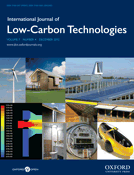
International Journal of Low-Carbon Technologies
Championing the integration of sustainability and technology.International Journal of Low-Carbon Technologies is a premier, peer-reviewed publication dedicated to advancing the field of low-carbon technologies and sustainable practices. Published by OXFORD UNIVERSITY PRESS, this journal serves as a vital resource for researchers, professionals, and students alike, providing insightful research and innovative solutions for a sustainable future. With its ISSN 1748-1317 and E-ISSN 1748-1325, the journal is recognized globally, boasting an impressive impact in its categories, including a Q1 ranking in Architecture and Q2 rankings in both Civil and Structural Engineering and Environmental Science as of 2023. It is open access since 2014, facilitating the dissemination of knowledge to a wider audience, and encourages critical discourse on environmental sustainability across converging disciplines. The journal’s Scopus rankings reflecting its standing—ranked #23 in Architecture (88th percentile) and #130 in Civil and Structural Engineering—underscore its importance in driving forward the scientific agenda in low-carbon technologies. As we journey from 2007 towards 2024, the International Journal of Low-Carbon Technologies remains a cornerstone for research and dialogue in reducing carbon footprints and promoting resilient infrastructure.